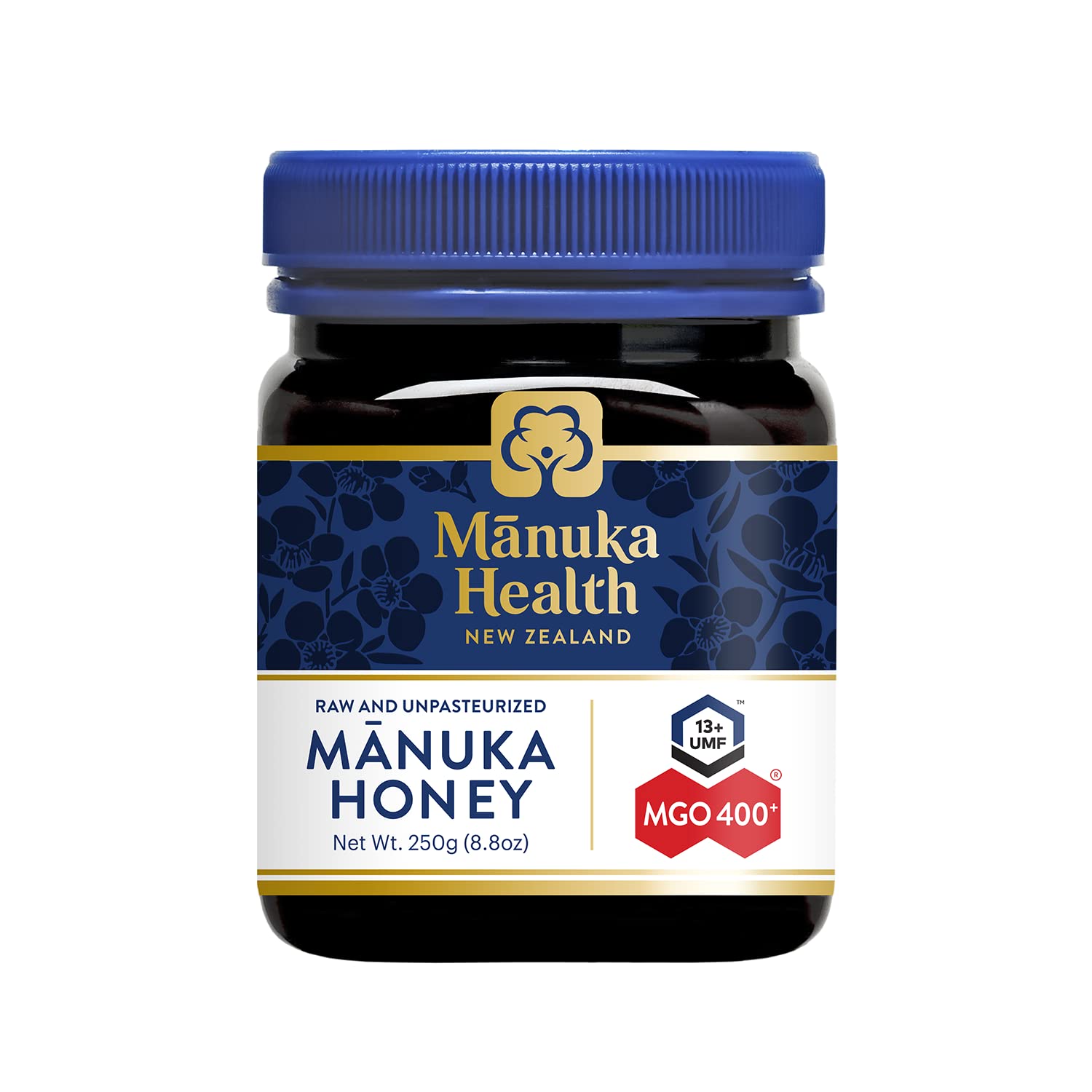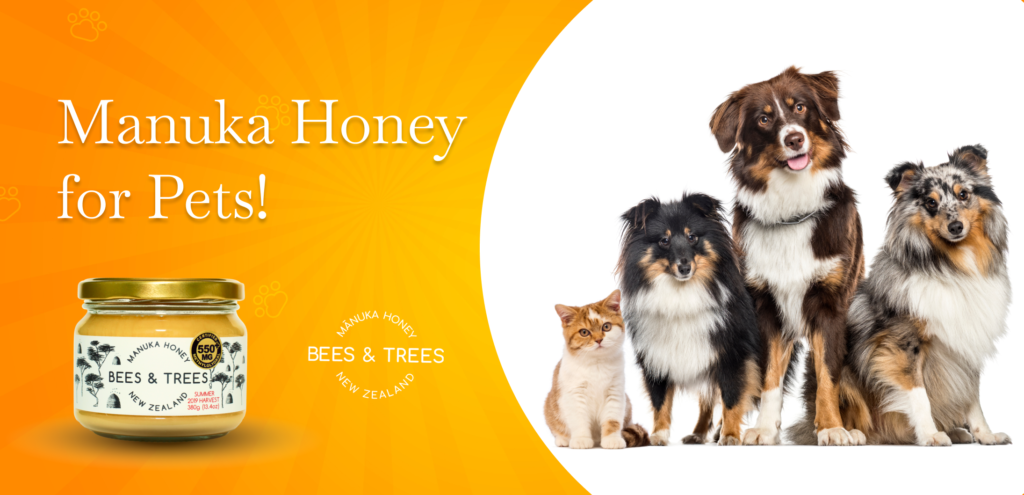
Are you wondering if Manuka honey can provide health benefits for your furry friend? In recent years, there has been growing interest in the potential benefits of this unique type of honey for dogs. Known for its antibacterial and anti-inflammatory properties, Manuka honey has been used in wound healing and human health for centuries. But can dogs enjoy the same benefits? In this article, we will explore whether dogs can benefit from Manuka honey and how it may promote their overall well-being. So, if you’ve ever wondered if it’s safe to share a spoonful with your canine companion, keep reading to find out!
Benefits of Manuka Honey for Dogs
Manuka honey, derived from the nectar of the Manuka tree found in New Zealand, has gained popularity for its numerous health benefits. While it is commonly known for its medicinal properties in humans, you might be wondering if it’s safe and beneficial for your four-legged friend as well. The good news is that yes, dogs can indeed benefit from Manuka honey in various ways. Let’s dive into the specific benefits it offers for our furry companions.
Beneficial Properties of Manuka Honey
Manuka honey contains a unique compound known as methylglyoxal (MGO) which gives it its potent medicinal properties. This compound provides Manuka honey with its antibacterial, antiviral, anti-inflammatory, and antioxidant effects. These properties make it a powerful and natural addition to your dog’s diet.
Anti-inflammatory Effects
If your dog suffers from inflammation-related conditions such as arthritis or joint pain, Manuka honey can be a valuable supplement. Its anti-inflammatory properties can help reduce swelling, inflammation, and discomfort, ultimately improving your dog’s mobility and overall quality of life. Incorporating Manuka honey into your dog’s diet may help alleviate the daily discomfort caused by chronic inflammation.
Antibacterial and Antiviral Properties
One of the key benefits of Manuka honey is its ability to fight off harmful bacteria and viruses. The unique combination of MGO and hydrogen peroxide in Manuka honey makes it a potent antibacterial and antiviral agent. It can help prevent and treat various infections, such as skin infections, urinary tract infections, and respiratory infections, in dogs. Adding Manuka honey to your dog’s diet can aid in keeping their immune system strong and protecting them from bacterial and viral diseases.
Promotes Wound Healing
Manuka honey has been used for centuries as a natural remedy for wound healing. When applied topically, it creates a protective barrier over the wound, preventing contamination and promoting faster healing. Manuka honey’s antibacterial properties also help eliminate harmful bacteria from the wound, reducing the risk of infection. If your dog has any cuts, wounds, or skin irritations, applying Manuka honey topically can accelerate the healing process and provide relief.
Digestive Health Benefits
Just like humans, dogs can experience digestive issues such as constipation, diarrhea, and stomach ulcers. Manuka honey’s high enzyme content aids in the digestion and absorption of nutrients, which can help alleviate digestive discomfort in dogs. It can also be beneficial for dogs with inflammatory bowel disease (IBD) or gastroenteritis, as it helps soothe the intestinal lining and reduce inflammation. Adding Manuka honey to your dog’s meals can support their overall digestive health and improve nutrient absorption.
Boosts Immune System
A strong immune system is vital for your dog’s overall health and well-being. The unique composition of Manuka honey makes it a natural immune booster. It stimulates the production of cytokines, which are essential for a robust immune response. Regular consumption of Manuka honey can help strengthen your dog’s immune system, making them less susceptible to infections, allergies, and other immune-related conditions.
Soothes Allergies
Allergies can be a frustrating and uncomfortable experience for dogs. The good news is that Manuka honey’s anti-inflammatory and immune-boosting properties can help alleviate allergy symptoms in dogs. Whether your dog suffers from seasonal allergies, food allergies, or skin allergies, incorporating Manuka honey into their diet can provide natural relief and reduce itching, inflammation, and overall allergic reactions.
Supports Dental Health
Dental hygiene is crucial for a dog’s overall health, and Manuka honey can play a role in maintaining their oral health. The antibacterial properties of Manuka honey help combat harmful bacteria known to cause plaque, tartar, and bad breath. It can also reduce the risk of gum disease and tooth decay. Simply adding a small amount of Manuka honey to your dog’s dental care routine can contribute to healthier teeth and gums.
Assists in Treating Kennel Cough
Kennel cough, a highly contagious respiratory infection in dogs, can be distressing for both you and your furry friend. The antibacterial and antiviral properties of Manuka honey can help alleviate the symptoms of kennel cough and support the healing process. Its soothing properties can reduce throat inflammation and ease the persistent cough. Incorporating Manuka honey into your dog’s diet and providing small amounts of it throughout the day can aid in their recovery from kennel cough.
Reduces Symptoms of Arthritis
Arthritis is a common condition in dogs, especially in older dogs and certain breeds. The anti-inflammatory properties of Manuka honey make it an excellent natural remedy for managing arthritis symptoms in dogs. By reducing inflammation and improving joint mobility, Manuka honey can provide relief from pain, stiffness, and discomfort associated with arthritic conditions. Including Manuka honey in your dog’s diet can contribute to their overall joint health and alleviate the symptoms of arthritis.
Now that we’ve explored the numerous benefits Manuka honey offers for dogs, let’s move on to the important factors to consider when choosing the right Manuka honey for your furry friend.
Choosing the Right Manuka Honey for Your Dog
When selecting Manuka honey for your dog, there are a few key factors to keep in mind. Understanding the ratings and certifications, as well as avoiding fake or substandard products, is important to ensure you’re providing the best quality honey for your dog’s well-being.
Understanding MGO and UMF Ratings
Manuka honey is rated based on two different systems: MGO (methylglyoxal) and UMF (unique Manuka factor). The MGO rating indicates the concentration of methylglyoxal in the honey, while the UMF rating takes into account not only the MGO content but also the presence of other beneficial compounds. The higher the MGO or UMF rating, the more potent and higher quality the Manuka honey is. When choosing Manuka honey for your dog, look for a reputable brand that clearly displays its MGO or UMF rating to ensure you’re getting a genuine and effective product.
Certified Manuka Honey
To ensure the authenticity and quality of the Manuka honey you’re purchasing, look for the “UMF Certified” or “MGO Certified” seal on the packaging. These certifications indicate that the honey has undergone rigorous testing and meets the standards set by the Unique Manuka Factor Honey Association (UMFHA) or the Methylglyoxal New Zealand Manuka Honey Grading System. Certified Manuka honey guarantees that it contains the necessary levels of beneficial components to provide the desired health benefits for your dog.
Avoiding Fake or Substandard Products
Unfortunately, the increasing demand for Manuka honey has led to the presence of counterfeit or low-quality products in the market. To ensure you’re purchasing genuine Manuka honey, buy from reputable sources and check for proper certifications. Avoid products with vague or misleading labels, as they may not contain the necessary levels of MGO or other beneficial compounds. Investing in high-quality Manuka honey ensures that your dog is receiving the maximum health benefits without any potential risks or adverse effects.
Raw or Processed Honey
While raw honey is often considered the gold standard due to its minimal processing and higher nutrient content, it is important to note that not all raw honey is safe for dogs. Some strains of raw honey may contain a natural toxin called grayanotoxin, which can be harmful to dogs. Therefore, it is advisable to opt for processed Manuka honey that has undergone proper testing and certification. Processed Manuka honey retains the beneficial properties while eliminating any potential risks.
Now that you understand the factors to consider when choosing Manuka honey for your dog, let’s explore how you can incorporate it into their diet effectively.

How to Incorporate Manuka Honey in Your Dog’s Diet
When it comes to incorporating Manuka honey into your dog’s diet, it is essential to do so in a controlled and appropriate manner. Consulting with a veterinarian, determining the right dosage, and understanding the various methods of administration are key to ensuring your dog benefits from this natural remedy safely and effectively.
Consulting with a Veterinarian
Before introducing any new food or supplement into your dog’s diet, it is crucial to consult with a veterinarian. They can assess your dog’s specific needs, health conditions, and any potential interactions with medications or existing treatments. Your veterinarian can provide valuable guidance on incorporating Manuka honey into your dog’s diet, including the appropriate dosage and frequency based on their age, size, and overall health.
Determining the Right Dosage
It is important to remember that Manuka honey is still a form of sugar, and excessive consumption can lead to health issues such as obesity and diabetes in dogs. The recommended dosage of Manuka honey for dogs is generally based on their weight, starting with small amounts and gradually increasing if necessary. As a general guideline, it is recommended to start with a quarter to a half teaspoon for small dogs and up to one teaspoon for larger dogs, per day. However, always follow your veterinarian’s advice for the specific needs of your dog.
Mixing with Food or Administering Orally
One of the easiest ways to incorporate Manuka honey into your dog’s diet is by mixing it with their regular food. Simply add the recommended dosage of Manuka honey to their meals and mix well. This allows your dog to benefit from the nutritional properties of Manuka honey without any fuss or resistance. Alternatively, you can also administer Manuka honey directly orally, using a clean finger or a pet-friendly spoon. This method is useful if your dog has specific dietary restrictions or preferences.
Using Manuka Honey as a Topical Treatment
In addition to being consumed orally, Manuka honey can also be used topically to treat wounds, cuts, or skin irritations in dogs. Before applying Manuka honey, ensure that the affected area is clean and gently massage a thin layer of honey onto the wound or irritated skin. Cover it with a sterile bandage if necessary. This topical application can accelerate the healing process and provide relief from discomfort or itching. However, always consult your veterinarian before using Manuka honey topically, especially for severe or infected wounds.
As with any new addition to your dog’s diet or medical regimen, it is important to be aware of potential side effects and take necessary precautions.

Potential Side Effects and Precautions
While Manuka honey is generally safe for dogs, it is essential to be cautious and aware of potential side effects or risks associated with its consumption. Monitoring your dog’s health condition and being informed about its appropriateness for their specific needs are crucial aspects of responsible supplementation.
Allergic Reactions
Some dogs may have an allergic reaction to Manuka honey. If your dog experiences symptoms such as itching, swelling, or difficulty breathing after consuming Manuka honey, discontinue use immediately and consult your veterinarian. Allergic reactions can vary in severity, so it is important to be vigilant and seek professional advice if needed.
Obesity and Diabetes Risk
As mentioned earlier, Manuka honey contains natural sugars, and excessive consumption can lead to obesity and an increased risk of diabetes in dogs. It is important to adhere to the recommended dosage guidelines provided by your veterinarian. If your dog is overweight, diabetic, or has any existing health conditions, it is advisable to consult with your veterinarian before incorporating Manuka honey into their diet.
Evaluating Your Dog’s Health Condition
Certain health conditions may warrant caution or the avoidance of Manuka honey in dogs. If your dog has diabetes, is prone to obesity, or has a compromised immune system, it is crucial to consult with your veterinarian before introducing any new food or supplement. Additionally, if your dog is currently undergoing any medical treatments or taking medications, it is important to discuss the potential interactions or contraindications of Manuka honey with your veterinarian.
Now that we have covered the potential side effects and precautions, let’s address some commonly asked questions regarding dogs and Manuka honey.
FAQs about Dogs and Manuka Honey
Can all dogs have Manuka honey?
While Manuka honey can be beneficial for most dogs, it is important to consult with a veterinarian before giving it to your dog. Certain health conditions or dietary restrictions may make Manuka honey inappropriate for some dogs. Always seek professional advice to ensure the best outcome for your furry friend.
What is the recommended dosage for dogs?
The recommended dosage of Manuka honey for dogs can vary based on their weight, overall health, and specific condition. As a general guideline, starting with small amounts, such as a quarter to a half teaspoon for small dogs and up to one teaspoon for larger dogs, per day is advisable. However, it is important to consult with your veterinarian for personalized dosage recommendations.
Can puppies have Manuka honey?
Puppies can potentially benefit from Manuka honey, but it is important to introduce it gradually and under the guidance of a veterinarian. Puppies have more delicate digestive systems, and excessive consumption of Manuka honey may lead to digestive upset or other complications. Always consult with your veterinarian before giving Manuka honey to puppies.
Can diabetic dogs have Manuka honey?
Diabetic dogs require strict carbohydrate control, and Manuka honey is a source of natural sugars. Therefore, it is important to consult with your veterinarian before giving Manuka honey to diabetic dogs. They will be able to determine whether it is appropriate and provide guidance on the safe dosage and frequency.
Can dogs with allergies benefit from Manuka honey?
Yes, dogs with allergies can potentially benefit from the anti-inflammatory and immune-boosting properties of Manuka honey. However, it is crucial to consult with your veterinarian to determine the underlying cause of the allergies and address them accordingly. Manuka honey can serve as a complementary treatment, but it should not replace appropriate veterinary care or medications.
In conclusion, Manuka honey can offer various benefits to dogs, ranging from its anti-inflammatory and antibacterial properties to its ability to support digestive health and boost the immune system. When choosing Manuka honey for your dog, ensure it is of high quality, certified, and appropriate for their specific needs. Consult with your veterinarian to determine the right dosage and method of administration. As with any supplement or natural remedy, it is important to be aware of potential side effects, take necessary precautions, and monitor your dog’s health condition. By incorporating Manuka honey responsibly, you can enhance your dog’s overall well-being and contribute to their happy and healthy life.
